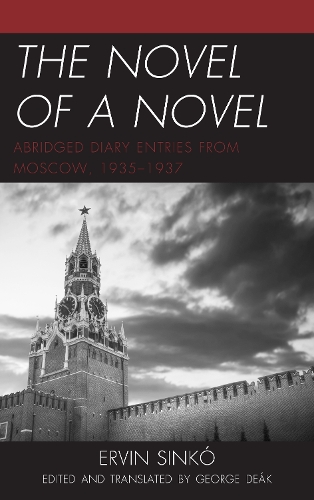
The Novel of a Novel: Abridged Diary Entries from Moscow, 19351937
(Hardback)
Publishing Details
The Novel of a Novel: Abridged Diary Entries from Moscow, 19351937
By (Author) Ervin Sink
Edited and translated by George Dek
Bloomsbury Publishing PLC
Lexington Books
20th March 2018
United States
Classifications
Professional and Scholarly
Non Fiction
Literary studies: c 1900 to c 2000
Published diaries, letters and journals
European history
891.8385209
Physical Properties
Hardback
380
Width 158mm, Height 238mm, Spine 34mm
739g
Description
One of the first critiques of Stalinism from within the communist movement, The Novel of a Novel is a memoir in the form of a journal. It was first published in Yugoslavia in 1955 based on the journal, letters, clippings, and other materials kept by the Hungarian-Jewish novelist Ervin Sink during his two years in Moscow between 1935 and 1937, years in which the Soviet cultural policy of the Popular Front was giving way to the Great Terror. Sink and his wife travelled to the home of socialism with great hopes. He had just completed his novel Optimists on the Hungarian Revolutions of 19181919 but could not find a publisher for it in Depression-era Paris. He went to Moscow at the urging of Romain Rolland and at the invitation of VOKS, both promoters of the Soviet Union as the center of a new civilization. Sink's optimism however soon gave way to grave doubts. Fearful publishers kept him in limbo and starving despite the support that Sink had from Bla Kun and Alfred Kurella of the Comintern. Sink deplored the over-centralization of cultural policy, attacks against the avant-guard, the forcing of Socialist Realism, the cult of Stalin, the reverses on abortion, the development of a privileged class of managers and Stakhanovist workers, and finally, the advent of the show trials. He tried to understand these developments through conversations with a great many people of the German and Hungarian communist diasporas, the visiting French Left, and local Russians among whom he was allowed to live. In the second year of his stay, the Sinks shared an apartment with the writer Isaac Babel and his wife, Pirizhkova. The story of the tragic misunderstanding that ensued between the two men reveals much about Babel's difficult situation and about the limits of Sink's understanding of the Terror. The Sinks were fortunate to be expelled from the country. But even back in France, Sink was prevented by his fear of the fascist threat from openly criticizing the Soviet Union. It was a miracle that the couple survived both the terror and the Holocaust.
Reviews
An astonishing book. It is astonishing that Ervin Sink kept such a witheringly sincere diary during the purges in Moscow, and astonishing that he was able to preserve it. His endless, forbidding, and frustrating encounters with Soviet bureaucrats slowly erode his faith in Soviet rule and stoke his disillusionment, just as arrests, trials, and a corrosive fear enveloped his circle of friends. Sink's meetings with several iconic figures, among them Isaac Babel and Mikhail Koltsov, the visiting Romain Rolland, along with glimpses of Sergei Eisenstein and Solomon Mikhoels, are a unique source of insight and information about life in Stalin's ruthless kingdom. Faced with the rising threat of fascism, Sink wanted to hold onto his faith in the Soviet Union but he was too honest with himself to disregard the reality that never stopped slapping him in the face. -- Joshua Rubenstein, Harvard University
Ervin Sinks combination of diary and memoir is a riveting and insightful read about life in Moscow during the early years of Stalin's terror. Many of the prominent acquaintances he writes about became victims of the chistka, or Soviet purge. The historian George Deks masterful abridged translation does justice to the original work, which is an important eyewitness contribution to the understanding of a crucial era. -- Peter Pastor, Montclair State University
A frank and sober witness testimony by a Western revolutionary writer written in the Soviet Union in 193537, in the days of growing repression and political purges. Ervin Sinks contemporary diaries were written under unique circumstances, as the writer struggled in the Kafkaesque maze of the Soviet cultural and literary labyrinth. Sink has put on record controversial public and private debates about the Moscow Trials amongst the major Western supporters of the Soviet UnionRomain Rolland, Andr Malraux, Jean-Richard Bloch, and others. His account of the fear-induced behaviors by the Soviet cultural eliteMaxim Gorky, Isaac Babel, Sergey Eisenstein, Mihail Koltsov, Sergey Tretyakov, and the cultural institutions leaders official Alexandr Arosev (VOKS) and Mikhail Apletin (Foreign Commission of the Soviet Writers Union)is particularly striking. A new light is shed on the actions of the Western Comintern members Bela Kun, Alfred Kurella, and other foreign communists as the Comintern was heading towards a massive purge. -- Ludmila Stern, University of New South Wales
It is not easy to be a revolutionary in the country of the victorious revolution. Ervin Sinks diary of the two years he spent in Stalins Moscow at the time of the show trials is a jewel, offering a very rare account of the dilemmas and contradictions faced by a Central European anti-fascist intellectual confronted by the realities of Soviet life and politics. Sink analyzes with great lucidity how the regime molds its citizens behavior and worms itself into their minds. A denizen of Moscows literary and cinematic world, he also gives the reader a vivid picture of the anxiety, compromise, and defiance involved in surviving as an artist and a human being. With a brilliant introduction by translator George Dek, this is an essential book on the utopian hopes invested in the Russian Revolution, and their disappointment. -- Brigitte Studer, University of Bern
Author Bio
Ervin Sink (18981967) was a Hungarian writer and intellectual. George Dek received his PhD in history from Columbia University.
